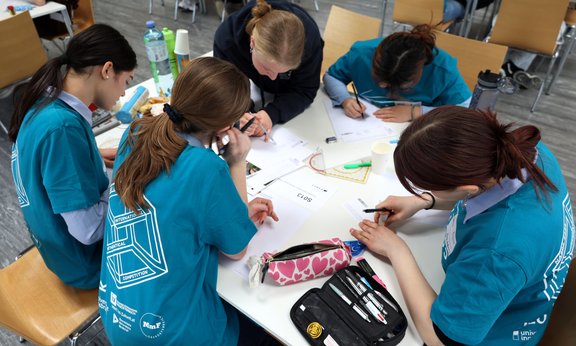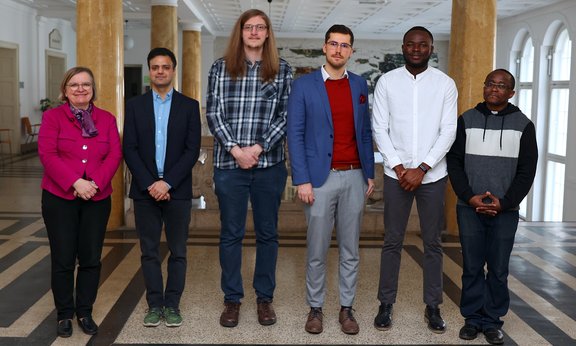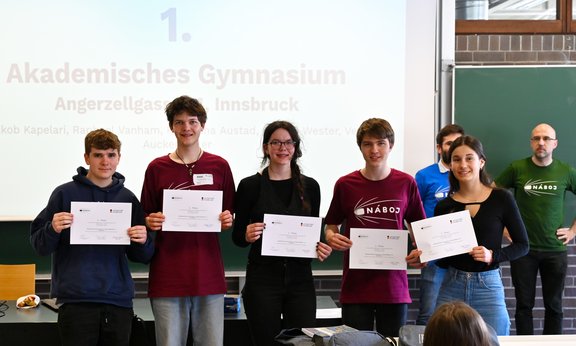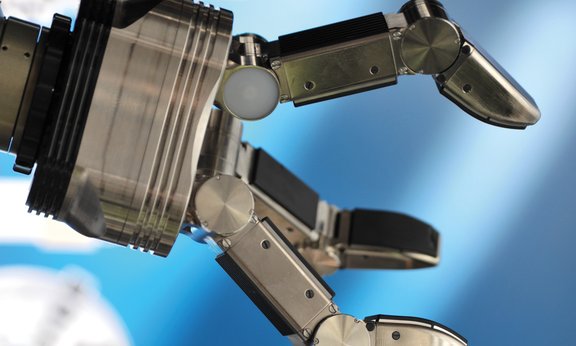Master’s Programme Mathematics
You want to model natural phenomena in the universal language of mathematics and formulate technical problems?
Mathematics, as a universal language, is the basis for science and engineering sciences. One of the main functions of mathematics is to develop solutions for problems within and outside of mathematics.
It is used to model natural phenomena and to express technical problems. Within the framework of digitalisation mathematics forms an essential building block for entering into progressive future careers.
Study code
UC 066 401
FAQ
Graduates possess highly specialized knowledge in two of the three fields of higher algebra and discrete mathematics, higher analysis and numerical mathematics or inverse problems, imaging and kinematics. They are able to apply their knowledge at the intersections of related sciences by independently formulate and substantiate scientific arguments and to find innovative solutions to problems.
The Master's Programme Technical Mathematics prepares for a highly qualified occupation as a mathematician in industry and in commerce as well as for the PhD Programme in Technical Mathematics. It deepens and widens the abilities and the knowledge in the field of mathematics that have been acquired during the Bachelor's Programme Technical Mathematics. The graduates are qualified for innovative solutions of mathematical problems originating from science, engineering, economy, and medicine. Therefore, during the master's programme the knowledge of both the foundations and the methods and algorithms of application-oriented branches of mathematics are deepened. An increased offer of research-guided courses stimulates in particular creative thinking and establishes a basis for the PhD programme.
In additon to the compulsory modules in Functional Analysis and Numerical Analysis of Partial Differential Equations, courses from the following areas are offered
- higher algebra and discrete mathematics,
- higher analysis and numerical mathematics as well as
- inverse problems, imaging and kinematics.
Students can chose two areas. The study programme is concluded with a master's thesis, which is a scientific paper from a branch of mathematics.
The career fields of the graduates of the Master's Programme Technical Mathematics are in particular the high-tech industry (modelling, developing and/or applying algorithms, developing and/or applying mathematical software), the fields of telecommunication and information technology, logistics, banks, insurance companies, statistical offices, and research institutions. Occupational profiles of graduates of the bachelor's programme can be found in fields where problem-solving capacities and specially trained analytical and systematic thinking are required (e.g. management, administration or consulting companies).
Graduates tracking: Shows which occupational fields students enter after graduation
Faculty of Mathematics, Computer Science and Physic Examination Office Information for students with disabilities
Curriculum
From the field

Mathe-Talente aus Westösterreich zeigten auf
Beim internationalen Mathematik-Wettbewerb Náboj kam ein Seniorteam der Oberschulen Fallmerayer in Brixen auf den 6. Platz der Österreichwertung. Das Juniorteam des Bundesrealgymnasiums Adolf-Pichler-Platz in Innsbruck belegte den 7. Platz. Zum zweiten Mal beteiligten sich am Freitag an der Universität Innsbruck Schülerinnen und Schüler aus Tirol, Südtirol, Vorarlberg und Salzburg an dem Wettbewerb, der in zahlreichen europäischen Städten zeitgleich ausgetragen wurde.

Acht Doktoratsstipendien vergeben
Ende Februar 2023 wurde die dritte Tranche der Doktoratsstipendien aus der Nachwuchsförderung 2022 im Archäologischen Universitätsmuseum im Hauptgebäude vergeben. Acht Dissertant*innen aus sieben Fakultäten können sich über eine Förderzusage freuen.

Erfolg bei FWF-Projekten
Im Wettbewerb um Fördermittel des Wissenschaftsfonds FWF haben die Forschenden der Uni Innsbruck wieder sehr gut abgeschnitten: Bei der FWF-Kuratoriumssitzung im März wurden elf Einzelprojekte, ein Esprit-Projekt und eine Publikation genehmigt. Außerdem hat der FWF drei Exzellenzcluster bewilligt, an denen die Universität Innsbruck beteiligt ist.

Mathematik-Meister aus Tirol
Zwei der besten österreichischen Teams beim internationalen Mathematik-Wettbewerb Náboj kommen aus Tirol: Das Akademische Gymnasium Innsbruck belegte Platz 1 in Österreich und international Platz 27, die Oberschulen Fallmerayer aus Brixen belegten mit ihrem Seniorteam Platz 3 und mit dem Juniorteam Platz 5 in Österreich. Der Wettbewerb wurde an zahlreichen europäischen Standorten zeitgleich ausgetragen.
Related studies

Civil Engineering (Master)
Diplom-Ingenieur*in

Environmental Engineering (Master)
Diplom-Ingenieur*in








